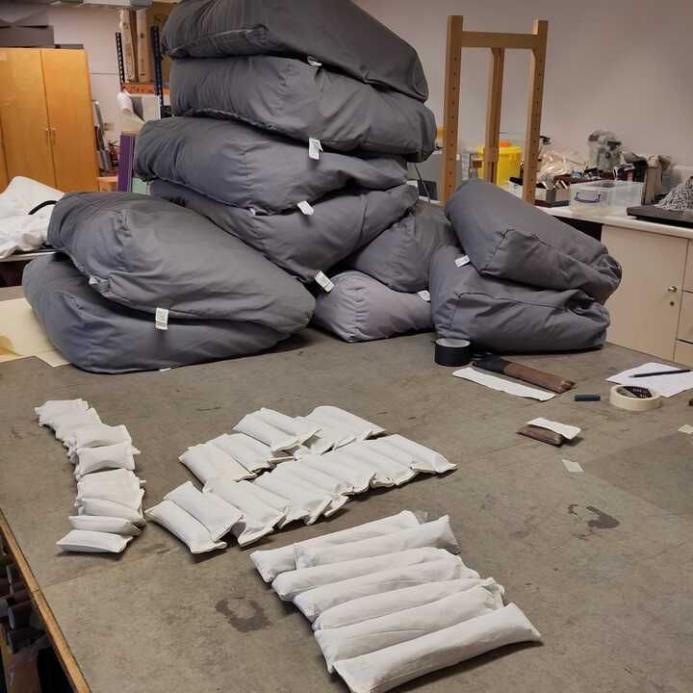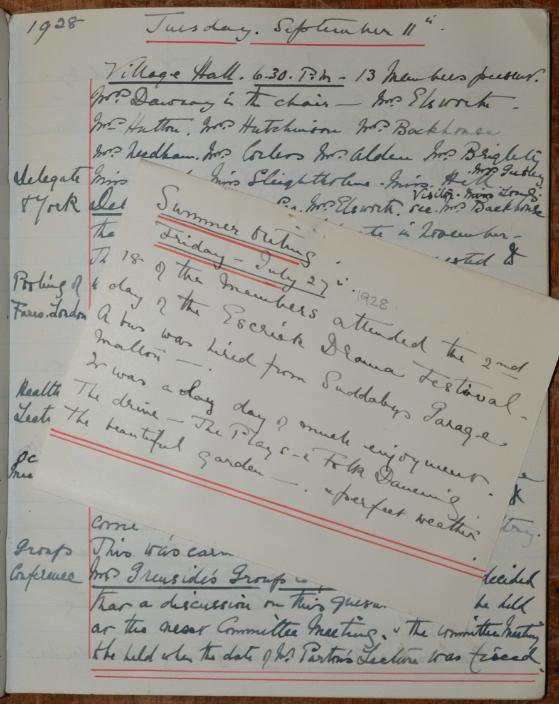Borthwick Newsletter - March 2024
Posted on 28 February 2024
March in the Archives - delve into our catalogues with this month’s featured description
Letter from Sarah Rowntree to her son Joseph Rowntree, 9 March 1857: Cold, wet weather; may go to visit the C. Robinson's as C & H made their appearance at Meeting yesterday; wants to know if Joseph's health; yesterday a party of young men went over to Osbaldwick to tea, including Harry; the evenings are now so light they get tea by daylight and there is time for a walk after; answers his inquiry about the gas at the Pavement shop, 'the Pavement apparatus is not thought to answer much purpose as to carrying off the offensive air, tho it gives a capital light'; expecting R. Naish to stay on her way to Edinburgh. [Rowntree Family Papers, RFAM/JR/RS/1/2/23]
Professor Jim Sharpe
It was with great sadness that we learned of the death in February of our colleague Professor Emeritus Jim Sharpe of the Department of History at York. Professor Sharpe joined York’s history department in 1973 and soon began work using the ecclesiastical cause papers in the Diocesan Archive at the Borthwick. He subsequently published his work on Defamation and Sexual Slander in Early Modern England: The Church Courts at York (Borthwick Papers, 58, 1980) in our longstanding series of short monographs and later contributed another Borthwick Paper on Witchcraft in Seventeenth-Century Yorkshire: Accusations and Counter Measures (Borthwick Papers, 81, 1992). From 2007-10, he was involved in helping to support and steer our Church Court Records project as a member of the project board. The Andrew W Mellon Foundation-funded project was to help catalogue and index over 14,000 papers relating to cases heard between 1300 and 1858 in the Church Courts of the diocese of York in the online York Cause Papers database. An eminent social historian, great communicator and fondly remembered lecturer and colleague, we shall miss seeing Jim on and around campus and the library and our thoughts are with his family, friends, colleagues and former students.
What’s New?
We started February with our annual Collections Development Week. For five days we cleaned, box listed, catalogued and packaged - resulting in hundreds of new archival descriptions on Borthcat and some very clean book pillows and snake weights in the searchroom. We are very grateful for everyone’s patience during the week. As you know, we don’t close often, but Collections Development Week is a chance for us to catch up on important behind the scenes work so we can pass the benefits onto our researchers in the form of more accessible (and clean!) collections.

The university honoured two of our depositors this month, accompanied by a speech from our very own Gary Brannan, Keeper of Archives and Research Collections. Laurence Marks and Maurice Gran were awarded honorary doctorates in recognition of their contributions to television, theatre and musicals. Gary led the presentation, which can be viewed here, and you can find out more about their long careers in the Marks and Gran Archive on Borthcat.
Finally, March is Women’s History Month so we would be remiss if we didn’t remind you of our fantastic resources on the subject. You can read more about the collections we hold in our Women’s History Research Guide, or delve more deeply into the stories of individual women on our Borthwick Blog. Why not visit our online exhibition on the mysterious Rowntree ‘Aero Girls’? Or find out why the story of Joan of Leeds from our Archbishops Registers went viral in 2019, inspiring a Christmas burlesque show in London, and leading to the further discovery of Joan’s own account of events. We’ll be highlighting some of the many gems from our collections across the month, so keep an eye on our social media for more.
New Accessions
We took in four new accessions in February. When Laurence Marks and Maurice Gran visited the university for their honorary doctorates they also found time to drop off another four boxes of material for their archive. These include original scripts for their play based on the popular Cluedo board game and their BBC sitcom ‘Unfinished Business’, starring Harriet Walter and Jaye Griffiths, as well as programmes, computer discs and video cassettes. We’ve also added some recent university magazines and publications to the University of York Archive, and received a small addition to the archive of Hillards supermarket.
Our final addition is the brand new archive of York Arts Centre. Founded in 1968, it was one of the first arts centres of its kind, providing a space for artists in York to create and showcase their work in music, theatre, film, dance and the graphic arts. It was based in the converted church of St John, Ousebridge (for which the Borthwick also holds the parish records) and was active until 1999 when a lack of funding forced it to close. The surviving archive covers the period 1968-1998 and includes administrative records, posters and leaflets for events, scrapbooks of news cuttings relating to the Centre’s work, and video tapes.
New Catalogues
Number of archival descriptions on Borthcat on 1st March 2024: 133,675
It’s been a bit of a bumper month for cataloguing, thanks in large part to our Collections Development Week. We’ve added two confectionery related catalogues: the archive of John Henderson and of Yorkshire Moulds Ltd. John Henderson was the great nephew of John Mackintosh, founder of John Mackintosh & Sons of Halifax, the firm most famous for creating the Quality Street chocolate collection. Henderson worked at the family firm in the 1960s and 70s and played a key role in the development of another family favourite - the Toffee Crisp. He also went on to work on Tooty Frooties and the much missed Caramac (the name formed from the amalgamation of Caramel and Mackintosh). His archive includes notes and photographs relating to his time with Mackintosh which merged, in 1969, with Rowntree & Co of York to form Rowntree-Mackintosh. In 1982 Henderson became the Managing Director of Yorkshire Moulds which supplied plastic moulds to confectionery companies and as a result we also have a small group of records relating to the activities of the Board and Henderson’s career there.
We’ve also listed 16 more boxes of material from the archive of television producer Ernest Maxin. The new boxes, numbers 17-32 on the catalogue, include rare early photographs of Maxin from the 1920s and personal memorabilia such as his autograph book, appointment diary, press cuttings and correspondence. They also include scripts, lyrics, production correspondence and promotional materials for the short lived, ‘Barnardo’, a 1980 stage musical written, composed and directed by Maxin. The musical was based on the life on Dr Barnardo, the philanthropist and founder of homes for poor and deprived children. Although the musical was decidedly not a success, the archive allows us to look behind the scenes, from the initial research notes to the final reviews.

Staying in the realm of television but a world away from light entertainment are the records relating to the Kurt Waldheim Television Documentary, now fully catalogued for the first time. Waldheim served as President of Austria from 1986-1992. In 1988 Thames Television and HBO (Home Box Office) broadcast a documentary using the format of a Commission of Enquiry to investigate Waldheim’s alleged involvement in wartime atrocities in the Balkans in the 1940s. The television enquiry was presided over by five former judges and concluded that Waldheim was not answerable to charges of war crimes. The archive includes bundles of documentary evidence prepared for the former judges taking part, production notes, and a rebuttal to the allegations issued by Austria, with copies of relevant documents, making up a fascinating, albeit very difficult archive.
Finally, our searchroom team took full advantage of our Collections Development Week to make some impressive progress on our parish archives. Over the course of the week they catalogued 263 new files across the parish collections and retroconverted the catalogue for the parish of Riccall. Their efforts turned up a particularly surprising find from the parish archive of York’s St Michael le Belfrey - an envelope purporting to contain a fragment of the coffin of St Cuthbert, the 7th century saint and Bishop of Lindisfarne!
Borthwick Out and About
We published a brand new blog in February. Dr Phillip Burnett of the university’s School of Arts and Creative Technologies kindly contributed, “Mad on Plain-song”: Music and the Mission Archive’. Inspired by a 1904 document in the archive of the Society of the Sacred Mission, an Anglican religious order with links to Southern Africa, the blog explores the life and work of missionary William Norton. It was Norton who was memorably described as ‘a bit of a poet, a beautiful linguist, and mad on plain-song’, one of the oldest styles of European sacred music and one which he used in his mission work in Africa. Dr Burnett discussed his work further at an School of Arts and Creative Technologies Research Seminar held on 28th February, entitled ‘What links the study of music, the University of York, and Modderpoort?’
On 13th March our Access & Digital Engagement Archivist Laura will be taking part in a round table for the 'History Matters' joint conference between the Royal Historical Society, University of York and York St John University. She'll be answering questions on the theme 'Why History Matters: Communicating History', talking in particular about her work around communicating history to students and audiences with different and diverse needs. The conference will conclude with a public lecture from Professor Fay Bound Alberti of King's College London (formerly of University of York), entitled ‘Why History Matters to Medicine: The Case of Face Transplants’. For more information about the public lecture and to book your tickets, see the Eventbrite page.
And on that subject, did you know our Access & Digital Engagement Archivist Laura is a Trustee of the British Association for Local History (BALH)? BALH run a series of online public talks on all things local history, and their new Spring series is now underway. They have talks on the history of Ipswich and Perth, plus the annual Dymond lecture, which this year is by Professor Fiona Edmonds of Lancaster University, titled ‘Northumbrian institutions reconsidered: three upland communities in medieval Britain’. For more information on the events programme, please see the Events page on the BALH website.
Lastly, if you are a member of a group or organisation working in North Yorkshire and the surrounding area and potentially in need of project funding we may have a date for your diary. On the 12th March at 1pm the National Lottery Heritage Fund and North Yorkshire Council will be holding an event at the Milton Rooms in Malton, North Yorkshire, to discuss their future work and funding opportunities The event gives you a chance to connect with other local organisations and meet members of the Heritage Fund’s engagement team to discuss project ideas. You can find out more online.
Archive of the Month: Records of closed branches of the North Yorkshire East Federation of Women's Institutes
What is it? The surviving records of 53 branches of the Women’s Institute active in North Yorkshire between the 1920s and the 1990s.
Where can I find it? The catalogue is available online and we are expecting another addition to it in the near future.
Why is it Archive of the Month? Given that March is Women’s History Month it seems appropriate to celebrate an archive that has been part of women’s history in Britain for more than a century. The first WI was established in Canada in 1897 but it arrived on these shores in 1915, with the very first WI meeting held in Wales on Ynys Môn (the Isle of Anglesey). Today the WI tends to be associated with ‘Jam and Jerusalem’ and there’s a very good reason for this. The Institute was established to broaden women’s knowledge of domestic science and agriculture, as well as to offer companionship and society, and it came to Britain at a time when it was sorely needed. With so many men away on military service, women’s work was crucial to the war effort and the WI encouraged women to become more involved in the production of food and to work together to improve their rural communities. Many of the leaders of the early WI were also involved in the movement for Women’s Suffrage and the song ‘Jerusalem’, which had been adopted by the movement in 1917, became the song of the WI as well from 1924 onwards.
The Yorkshire Federation of Women’s Institutes was formed in 1920 and the earliest records in the archive date from this decade, with the latest dating from the 1990s. They include minute books, financial papers, membership information and other interesting ephemera that tell the story of more than fifty different branches across the region, from small villages like Wombleton to market towns such as Selby and Thirsk.
It is interesting to note that the archive shows that many local WIs closed in or around 1983, the date at which the Yorkshire Federation was divided into six smaller entities (one being North Yorkshire East). The division of the Yorkshire Federation was supposed to have taken place in the 1970s following the 1974 reorganisation of historic county boundaries in Britain. However the move faced strong resistance in Yorkshire, setting the majority of the county institutes against the national leadership and resulting in the closure of many local branches. In 1982 the WI National Council voted that the Yorkshire Federation should comply with the organisation’s national boundaries policy and the six smaller federations were duly created the following year. The Borthwick is fortunate to hold the archive of the original Yorkshire Federation of Women’s Institutes, as well as the records of the closed local branches, allowing researchers to dig into the long and interesting history of a fiercely independent organisation.
We’ll be back in April with more news from the archives!


